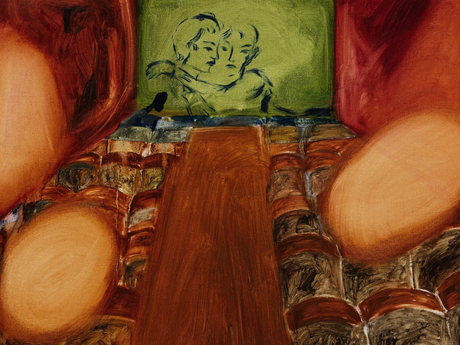
In today’s dating landscape, ghosting has become an all too common occurrence, leaving many feeling disrespected and discarded. But beneath the surface lies a deeper issue: how white supremacy manifests in our romantic interactions. This story explores how ghosting reflects broader power dynamics and systemic inequalities, shedding light on the need for accountability and introspection in our personal relationships.
21st-century dating is ruled by a capitalist hunger for consumption rooted in attention and lust. Swipe left, swipe right, swipe left 3 more times… it’s an endless cycle ruled by predatory apps whose mere existence is to ensure you stay in the perpetual cycle of dating. Ghosting is amongst the many issues we face while trying to navigate the modern dating scene. It’s left many feeling disrespected and disregarded. It’s a comfortable and selfish behavior where empathy and consideration for others don’t exist. As a society, we are plagued by avoidance and lack of accountability, and it’s reflected in our interpersonal relationships.
After being ghosted and meeting people who fear confrontation I began to ask myself, why do we date like this? Where did these behavioral patterns begin? I’ve been rigorously studying the characteristics of white supremacy to really get down to what actions are needed to decolonize my subconscious and community. As I was studying something clicked, one of the pillars of white supremacy is fear of (open) conflict and right to comfort- which is exactly what ghosting is. Whether you’re looking for “the one” or exploring, conflict avoidance won’t garner successful results in dating.
I’m no saint, I’ve ghosted before. As I’ve grown into the woman I am now, I’ve had to come to terms with conflict as a part of all relationships. Conflict resolution is needed and should always be prioritized, especially in relationships you value. Now I’m writing about this as a part of my journey to decolonization, but also to raise a very important conversation about how we value our relationships and interact with each other. I’ve realized how I’ve had no interest in conflict resolution with relationships that I was no longer invested in or had no intention to pursue. That was very emotionally immature of me. Though I may not have sought a platonic or romantic relationship with these individuals, they deserve my respect and transparency with how I wanted to end things.
White supremacy has been so deeply ingrained in us that it shows up in our day-to-day lives from how we make choices, to the choices we make, to how we engage with each other. White supremacy as defined by Oxford Dictionary is “the belief that the white race is inherently superior to other races and that white people should have control over people of other races”. Through this belief of superiority, white supremacists were able to build a culture in which they avoided accountability and fostered a pervasive fear of conflict. White supremacy was one of the most successful and insidious tools of colonization. It is upheld by the Right to Comfort, Fear of Open Conflict, and Power Hoarding, Defensiveness and Denial, Fear, Either/Or and the Binary, and many other characteristics.
Avoidance and fear of conflict (ghosting) are passive-aggressive behaviors that are utilized for manipulation or to escape situations/relationships without explanations and accountability. I was ghosted 2 years ago by someone I was seeing for a couple of months. I had felt something was being hidden from me- he was hiding the fact that he was married. Instead of taking accountability and owning up to his errors, he chose to ghost me instead because it was the easiest way to escape. Like many who’ve been ghosted before, this left me feeling angry, disrespected, disregarded, and deceived. As I’ve healed and revisited my contribution to choosing to be blind to red flags, I began to see the similarities with a system I’m so bent on dismantling.
Ghosting isn’t just an action of someone who seeks to avoid an issue, but it’s also a behavior rooted in avoiding accountability. Let’s think about it, confrontation requires you to recognize your wrongdoings and contributions to a conflict. With ghosting you quite literally avoid and move on, without realizing the damaging long-term effects it has on your development as it pertains to conflict resolution and emotional maturity/intelligence. I began to ask myself- What do white supremacy and white privilege have in common with ghosting behaviors? The answers are simple- avoidance (in general), right to comfort, fear of open conflict, and avoiding accountability.
For us to learn and evolve as individuals and as a society we must reflect on our participation in our own suffering which can look like procrastination or self-sabotage. Now this is not applicable when discussing oppression as the oppressed have zero responsibility in being oppressed. Oppression is inflicted upon individuals and groups through systemic injustices and power imbalances, and the responsibility lies solely with the oppressors and the systems that uphold these injustices. While personal accountability is crucial for personal and relational growth, it should never be conflated with the unjust burdens placed on those who are oppressed. By understanding and addressing both personal behaviors and systemic issues, we can work towards a self-aware and decolonized society.
Let’s analyze accountability avoidance and victim mentality. Take Israeli propaganda for example. Israel has been carrying on genocide since 1948 but has labeled themselves victims because of October 7th. You see it in Karens who attack and harass Black people but when faced with the consequences of their actions all of a sudden they turn into victims. This also looks like cheating on a partner and victimizing yourself then placing all the blame on your partner. This also looks like creating conflict with a friend and instead of seeing your participation in it, you choose to place all the blame on the other party. All of these examples exhibit the behavior of people who are avoiding conflict and who don’t believe there should be consequences to their actions. I don’t believe in coincidences, especially as it pertains to something so dark and well thought out like colonization and white supremacy. I don’t want to say all toxic behaviors stem from white supremacy, however, if it smells like white supremacy… It is white supremacy.
Ghosting is a psychological terrorist tactic. I’m no longer in the business of not calling things what they are. Let’s BFFR. Simply Psychology defines ghosting as a toxic trait that “shows a lack of consideration for the other person’s emotions and well-being.” For those of us who’ve experienced racism and are actively trying to decolonize ourselves, this definition and description sound a little too connected to white supremacy.
Fear of conflict and accountability avoidance aren’t exclusive to ghosting. These white supremacist behaviors also show up in how we respond to conflict resolution. Engaging meaningfully when resolving conflicts is vital for maintaining healthy relationships and fostering mutual respect. Conflict is an inevitable part of any relationship, and avoiding it can lead to unresolved issues and lingering resentment. By facing conflicts head-on, we can address misunderstandings, set boundaries, and build stronger connections. Engaging in conflict resolution demonstrates emotional maturity and a commitment to personal growth. It requires us to listen actively, empathize, and seek solutions that respect the needs and feelings of all parties involved. White Supremacists Culture created a document that highlights many behaviors linked to white supremacy and the behaviors that serve as antidotes to fostering healthy relationships rooted in mutual respect.
“Fear of (open) conflict shows up as:
- people in power are scared of expressed conflict and try to ignore it or run from it;
- when someone raises an issue that causes discomfort, the response is to blame the person for raising the issue rather than to look at the issue which is actually causing the problem;
- emphasis or insistence on being polite; setting the rules for how ideas or information or differences of opinion need to be shared in order to be heard (in other words, requiring that people “calm down” if they are angry when anger often contains deep wisdom about where the underlying hurt and harm lies);
- equating the raising of difficult issues with being impolite, rude, or out of line; punishing people either overtly or subtly for speaking out about their truth and/or experience;
- labeling emotion as “irrational” or anti-intellectual or inferior, which means failing to recognize the importance of emotional intelligence;
- pretending or insisting that our point of view is grounded in the “rational” or the
- intellectual when we are in fact masking our emotions with what appear to be rational or intellectual arguments.
Antidotes or suggestions for how to show up in more connecting and healing ways:
- role play or discuss or plan for ways to handle conflict before conflict happens;
- distinguish between being polite and raising hard issues;
- don’t require those who raise hard issues to raise them in ‘acceptable’ ways, especially if you are using the ways in which issues are raised as an excuse not to address them;
- develop your emotional intelligence so you can tell when you are hiding your emotions with the excuse that you are being “rational;”
- be transparent about power, so that everyone understands who makes the final decision and/or how the final decision is made before you dive into the conflict;
- invite a third or “neutral” party to support the exploration of the conflict;
- assume that everyone has a very good reason for their position and seek to lift those to the light of day;
- once a conflict is resolved, take the opportunity to revisit it and see how it might have been handled differently.”
My theory is very simple, divorcing from white supremacist characteristics such as ghosting and avoidance, will take us one step further in decolonizing our minds and way of living/being. Who are we really outside of being imprisoned by fear of conflict? Who are we and how will we behave when these behavioral patterns are no longer a part of us? I know it’s difficult to imagine existing in a world where these systems don’t plague every detail of our existence. I’m not asking you to jump into a new reality- decolonization is an ongoing process. I’m asking you to choose self-evolution and to truly adopt introspection. We must analyze our behaviors and ask ourselves: is this my nature-human nature? Or is this behavior a product of a colonized mind?
I’ve put together some digestible resources that will meet you wherever you are on your decolonizing journey. Education is power. Education is liberation.
Resources:
https://www.whitesupremacyculture.info/characteristics.html
https://www.merriam-webster.com/dictionary/white%20supremacy
Characteristics of White supremacy and Behavioral BReakdowns: https://drive.google.com/file/d/1XR_7M_9qa64zZ00_JyFVTAjmjVU-uSz8/view
